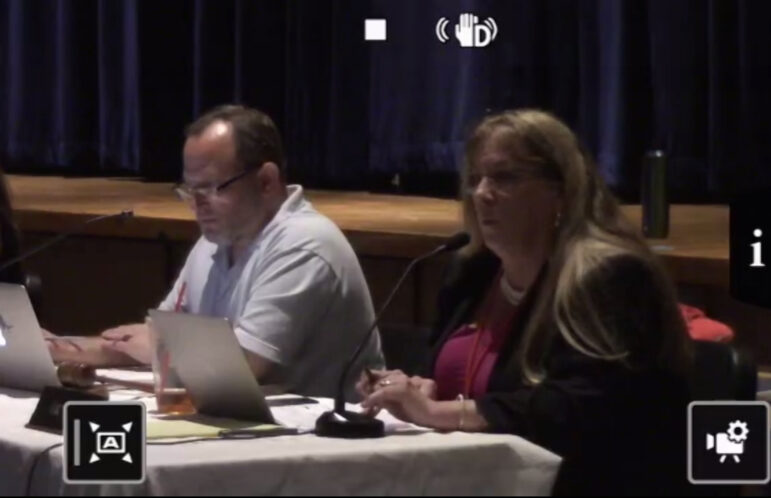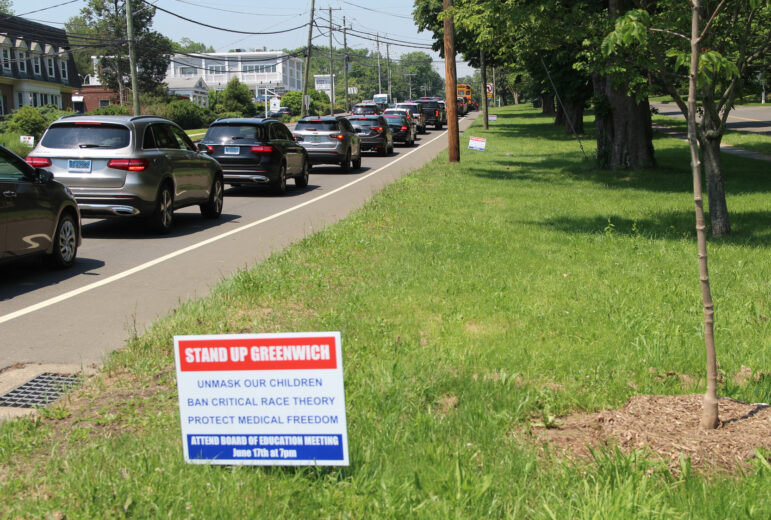This article has been updated to include comments from BOE chair Peter Bernstein on WGCH on Friday morning.
During Thursday’s Board of Education meeting, superintendent Dr. Toni Jones noted there were just three days remaining of school, and said students and staff had accomplished so much during the deadly Covid-19 pandemic and had been brave.
This year, following guidance from the State, Greenwich Schools gave families a choice between remote and in person learning, with elementary schools and middle schools open full time for in person learning and Greenwich High School offering a hybrid model where students were split into two groups, each attending school in person two days a week, with Wednesdays set aside for deep cleaning.
In recent weeks GHS reopened for in person learning five days a week. Per state guidance, students continue to wear face masks in school.
The meeting delivered many fiery moments, all of them during public comment.
For two weeks dozens of lawn signs encouraging people to attend the meeting and to “unmask our children,” “ban critical race theory,” and “protect medical freedom,” peppered the roadways across town.
So when BOE chair Peter Bernstein said there were 46 people signed up to speak, it was not a surprise. He warned that “cheering, booing and hollering” wasted time and that if there was a lack of civility the board might have to clear the room.
In her superintendent’s report, Dr. Jones did not mention critical race theory, and curriculum was not on the agenda, though she did send a letter parents a week earlier assuring them critical race theory was not part of the curriculum.
Mr. Bernstein has characterized requests to “ban” critical race theory as part of a campaign of misinformation.

Carol Sutton, who is retiring after 39 years as an educator, delivered her last set of remarks as the Greenwich Education Association (teacher’s union) president for eight years and four terms. (Her successor will be Lillian Perrone, Program Associate for PE and Wellness.)
“Unfortunately our fear of the pandemic has been replaced by dismay as our profession comes under attack,” Sutton said. “Many in the audience tonight are here because they believe that teachers are teaching a negative view of our country’s history and our present society, or that we are exposing our dear students to harmful or dangerous ideas.”
“We teach and model critical thinking, evidence-based decision making and productive discourse. We ask students to consult multiple sources and to evaluate those sources for reliability, and look at topics from multiple perspectives,” Sutton said.
“We can’t protect our students from ideas. We can only prepare them for ideas. That’s what the teachers will continue to do.”
– Carol Sutton, GEA president.
One hour was dedicated to public comment at the beginning of the meeting. Each speaker was given a three minute maximum. When the hour ran out, those who didn’t get to speak were given a chance to speak after the board conducted their business.
BOE chair Peter Bernstein had to remind the audience countless times to be quiet with their reactions. There were cheers and applause every time someone criticized the Greenwich Schools curriculum, using words like dangerous, radical, and racist, and “having the goal of engendering social justice activists.”
Kara Philbin said there was “an alarming pattern emerging in Greenwich Schools of prioritizing social-emotional learning and technology.” She said she hoped Secondary School Emergency Relief (ESSER 3) funding would be allocated to academics, rather than to social-emotional learning, family and community connections, or an upgrade to the student center at GHS.
Jackie Homan said she’d been bullied and intimidated after someone attributed the yard signs to her.
“When did curriculum shift from books like To Kill a Mockingbird to articles that tell my child how to write about Africa?” she asked. “Critical Race theory says my children were born racist simply because they were born white. How can that be? When are we going to get back to academics instead of activism?”
Ms Homan described “social and emotional learning” as a euphemism for critical race theory.
“The board is not fulfilling your legal responsibilities, and instead you are allowing our schools to get transformed into a social justice indoctrination center,” she continued. As her time ran out, she shouted at the board, “You should be ashamed.”
James Waters, a former Navy Seal, noted that the organizers of the lawn signs were allegedly a group called “Greenwich Patriots.”
Waters talked about what he called “credible patriotism,” saying said he had led a team of Navy Seals in Afghanistan who were humble and selfless.
“Be a true patriot and ignore the self-regarding voices trying to distract you,” he said. “Distractions founded on untruths and motivated by self-serving national media figures aren’t going to help you get it done.”
“For every wacky sign on our streets right now, there are 100 people in your corner,” he added.
David Lancaster said that while the administration claimed there was no intent to include critical race theory in the district’s curriculum, “It is already part of the curriculum through its many tentacles like SEL and that teachers and administrators are encouraged to read White Fragility.”
“This board needs to stand up and make it abundantly clear, publicly, that this racist curriculum and its tentacles has no place in our public schools,” he said. “We are not calling for the elimination of ethnic studies, which CRT is not. Nor are we racist. We are working to fulfill the exact same dream of a color blind society Dr. (Martin Luther) King spoke of and died for – and I think we can all agree that Dr. King was not a racist.”
Griffin Galletta, a GHS 9th grader, said critical race theory was dangerous to young minds.
He defined CRT as “the teaching of an oversimplified version of American history through a lens solely based on race, and relating these skewed teachings of the past to today’s America as a means to create race conflict in order to usher in anti-western Marxist values.”
He said teaching “diversity, equity and inclusion” in Greenwich Schools was a faction of CRT.
“In the name of the principles of democracy and the policies of the BOE, I call on the board to reassess this curriculum which seeks to divide, create conflict, and misrepresent and rewrite American history in order to usher in Marxism,” he said.
Megan Galletta, whose nomination to the building committee for the new GHS entryway was controversial last October 2020 because of concerns that she participated in maskless gatherings in Binney Park, said she was deeply concerned that the public schools were becoming politicized.
She said the said the BOE was allowing material to be taught that has not been approved.
“It’s obvious that the ugly, nasty political discourse in Washington has now infected Greenwich Schools,” she said. “It’s like a disease in our schools and it needs to stop. We need to return our strong community based values and foundation as a school system that does not allow politics to infiltrate and indoctrinate.”

Kristen Niemynski said students were not taught grammar and didn’t know what an adverb was.
“My son has been taught what pan sexual means, but not what a prepositional phrase is,” she said. “I want her to know proper grammar and not to be worried about whether she is using someone’s preferred pronoun or not. I don’t want her taught that she was born racist because she is white.”
“America has done more for minorities and people in need around the world than any other country,” she said. “We are not racist. We cannot allow CRT to poison the minds of our children.”
“It is not inspiring, it is demoralizing. It is not uplifting, it is demeaning,” Niemynski said. “Proponents like to call it ethnic studies or racial sensitivity or social-emotional learning, but what it is is a radical racist ideology.”
Several GHS students and recent graduates insisted critical race theory was not taught in Greenwich Schools and said they did not want their education censored.
“We cannot teach racist history as simply a Martin Luther King Jr quote and stories of Black success for one week of February,” one GHS student said. “You are telling me that you care for us so much that you would belittle us to push your agenda? I refuse to stand by the idea that censorship and complacency is being pushed onto our education so that discomfort is avoided.”
Mary Grace McCooey, from the GHS class of 2020, said never experienced critical race theory as its critics had been describing.
“I talked to my friends and none of them knew what critical race theory meant. None of the people I surveyed on my Instagram, none of the people I talked to knew what it is because it is not being taught,” she said. “What people who are afraid of politicizing the classroom don’t realize is that everything is political….to try to shield ourselves from political conversations at a young age actually prevents us from having us helpful and constructive conversations when we move to become adults, voters and citizens of the world.”
Seth Bacon, a public school parent, said he wanted an open and inclusive Greenwich.
“Many of the speakers we’ve heard from tonight have talked about how parts of the curriculum could effect their children and how offended they are. Their language is indicative of the problem we are discussing. There is no outward view. True discourse is about empathy and understanding others’ points of view,” he said. “Exploring and discussing how others may have experienced or felt the impact of events in US history is not shame based education. It is teaching compassion and teaching what true patriotism is about.”
“The good news is that the vast majority of young people don’t want to hear it. They know the world is becoming more accepting, more inclusive and more tolerant,” he added. “These kids are smart and they’re not going to be told what to think.”
Mr. Bacon said it was likely the conversation about curriculum would extend beyond Thursday night’s meeting.
On Friday morning Mr. Bernstein did a debrief of the meeting on WGCH 1490 am radio, that the signs that popped up across town talked about “things that were not in the district’s curriculum, things that are out of our control – masks for instance, that’s a mandate from the state.”
“At the end of the day we try to teach our students to be critical thinkers, to hear both sides of a problem and form their own opinions,” he said. “I hope the community is doing the same.”
He said the district has policies in place on what gets taught and how it is taught.
“We have a policy on academic freedom for our teachers because they do need leeway on how they teach topics,” he explained. “We also have a policy on teaching controversial topics. We can’t shy away from the fact that last November where we had a national election where people were on both sides. Those topics need to be discussed in the classroom by teachers, allowing for conversation and discourse.”
See also:
GHS PTA Envisions a Transformed Student Center
Greenwich Schools Chief: Critical Race Theory is Not Part of the District Curriculum